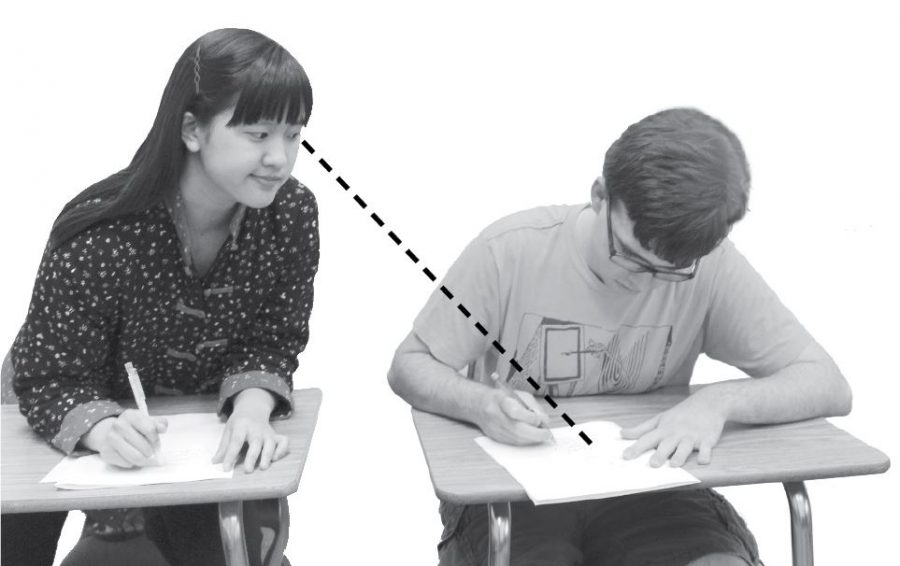Stacey ’16* “didn’t want to be a snitch.”
In her eighth period class, the statement on the wall reads, “I have neither given nor received unauthorized aid on this assignment.” Stacey looks up at the clock to see two minutes left for the quiz when she feels the heat of a gaze from her right. Eyes dart over her paper — number one, a, two, a, three, c.
Her classmate circles a, a, c on his quiz.
The teacher calls time, Stacey and her classmate lock eyes, but both sign the obligatory honor pledge with no hesitation, affirming the originality of their work with each word.
The honor code hangs in plain view of students throughout the campus, yet the exchange of unauthorized aid is ever-present in many classrooms. In a Chronicle poll of 442 students, 23 percent said they have cheated on homework, essays, quizzes or tests. Additionally, 71 believe that cheating is common among students at Harvard-Westlake.
Stacey said she didn’t realize her classmate was copying her answers the first time he did. Because she was not actively sharing her answers with him, she did not think she was breaching the honor code.
“It’s so widespread that [the school] can’t possibly get every single case,” she said. “I know it’s wrong, but it’s little things here and there that I don’t care enough to tell. While it can be annoying when students succeed after cheating, I think eventually it will catch up to them.”
Some students who have reported incidents of cheating to their teachers said the cheating continued.
Nadine* ’16 and multiple other students in her world languages class witnessed a classmate cheating on more than one assessment and decided to tell their teacher. After tests were collected, the student would change his answers after referring to the textbook while the teacher was out of the room.
“It was so obvious and frequent. Everyone saw him doing it,” she said.
However, Nadine said her teacher scolded her and her classmates for questioning the “honor” of a student that the teacher considered honest. The cheating persisted.
Robby* ’17 also told his teacher about a student who repeatedly looked at his and other students’ answers. Though the teacher thanked him for reporting it, Robby said he observed the student continuing to cheat on future tests and quizzes.
In another class, Nadine said her teacher often warned students during a quiz “to keep their eyes on their own paper.”
“Everyone in the class always knows who he’s referring to,” she said.
Nadine and Robby both said they did not know if the cases were taken to the Honor Board.
Junior prefect Grace Pan ’16 said cheating cases are only reviewed by the Honor Board if they are reported by a teacher. On a first offense, all teachers have the freedom to confront the student on their own, though the Honor Board is always a viable option.
Even when reported, the Honor Board only accepts cases after a committee reviews numerous factors, such as if the case has substantial evidence and an obvious violator.
The teacher is only required to alert the board on a second offense.
Although students are free to approach prefects about classmates they have witnessed cheating, the board always works through an administrator or teacher.
Math teacher Kevin Weis said he sometimes sees students’ eyes wandering during quizzes. Because he is not sure if a student intends to cheat or is prone to looking around subconsciously, he sends out warnings or moves the student to a different desk. Though he has never brought a student before the Honor Board for copying answers from another student, Weis said he would report a violation if it became obvious to him that a student was cheating.
Pan said the Honor Board aims to follow up with students and teachers even after rulings to prevent further violations of the Honor Code. If a student is brought in front of the board a second time, the stakes are higher, and consequences are more severe.
She said the board has received significantly fewer cases this school year, though this does not indicate a decrease in cheating but more likely a choice by the teachers to handle cases themselves.
She believes cheating occurs as part of the “Harvard-Westlake culture” in which many students feel pressured to be the best that they can and believe cheating will maximize their results.
“In the end, it’s a very broad goal for [Prefect Council] to decrease that type of competitive culture, and inherently those problems will be solved,” she said. “We are discussing tangible ways that we can make the small things go away, but it’s a work in progress.”
*Names have been changed.





























